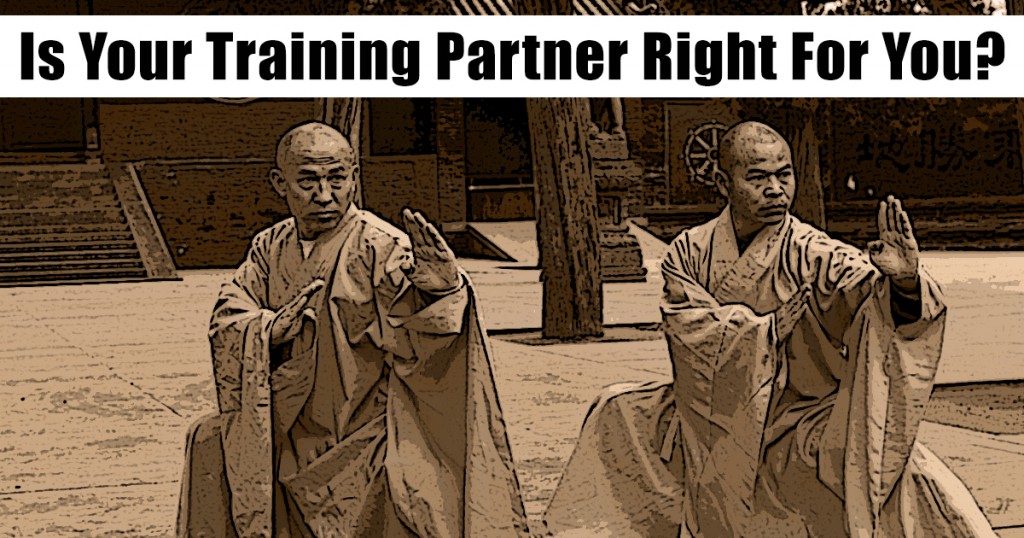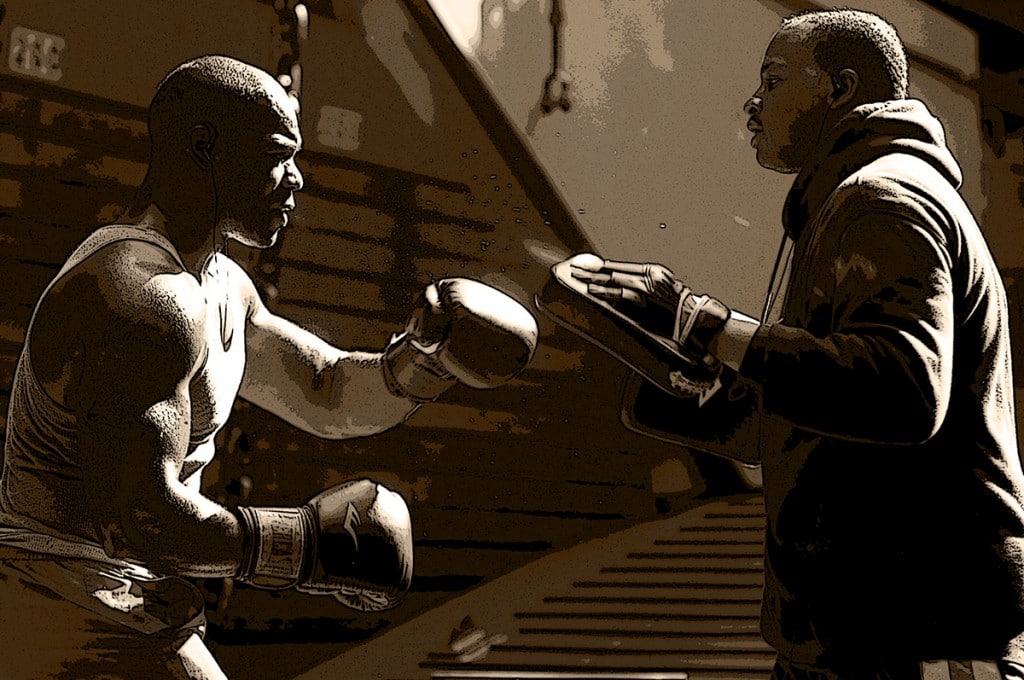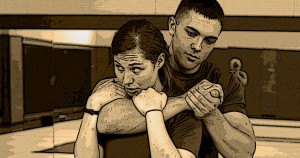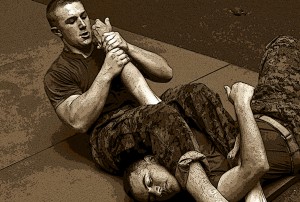We here at Enter Shaolin want to help you get over any training obstacles you may have. Sometimes when we are looking for sparring partners any warm body who is willing to train will do.
But soon we realize this training partner might not be right for us. So I want to cover how to know if your sparring partner is right for you.
This post idea comes thanks to one of our Enter Shaolin family members. I was chatting with him earlier today via the chat on our site.
This family member was wondering how we train. They described themselves as a peace-loving person, however, they were having problems with their sparring partner being too aggressive and wanted to know if that was okay or not.

What Makes A Good Sparring Partner?
In short, they weren’t feeling comfortable with their sparring partner and their training partner wasn’t respecting their needs which is the ability to safely work on their techniques within their skill.
It’s like Sifu Phu says, “Don’t go too hard too fast, someone could get seriously injured… Work within your partner’s skill and work up the intensity as their skill increases, so they can learn how to apply the technique correctly.”
And you may have noticed with some of Jamie’s training we have leaked here and there we are either chill or pretty hardcore. Jamie by far gets the most intense training of any of my current students.
Some days I go after her and other days it is more chill; in all cases, her skill keeps increasing. We have to train for different scenarios, so having a partner that is willing to be peaceful to intense within your skill is greatly important.
One thing I would like to point out is you can train intensely without being aggressive.
One of the reasons I can train Jamie more intensely is because we have mutual respect, she knows I have no intention of harming her, and I know what her goals are for her training, so I am always testing and pressing her skill.
This way she will know if she can handle whatever may come her way on the streets.
In short, Jamie and I are both peace-loving warriors, but that doesn’t mean we don’t train in ways that others may consider aggressive though we have no ill will towards each other.
Develop Trust With Your Sparring Partner
Other times our training is more chill, it really just depends on why we are training, etc.
This is why when you are figuring out what the best sparring partner for you is, you have to ask yourself a few questions…
What do I want to get out of my sparring? This is often neglected or the answer is surface-level only. Like… I want to be able to fight.
You and your sparring partner need to ask yourself this question, then when you answer ask why. Keep asking why to your response until you can’t answer why anymore.
When you get there you have the real reason why you want to spar.
Knowing each other’s why will not only help you understand each other more, but it will also help you hold each other accountable for training and will motivate you to keep training even when things are not seeming to go your way.
Without knowing why you are really sparring it will be hard to stay motivated, so make sure to do this exercise and let us know in the comments section at the end of this post why you really spar.
Am I getting value out of this sparring session or am I leaving it with negative feelings?
If you leave your sparring sessions feeling discouraged, angry, or scared, then you need to have a talk with your sparring partner and see if there can be a mutual solution.
Sometimes people really have no idea they are being too aggressive, etc. If no resolution can be made, then it is time to end the training relationship.
Maybe it’s your best friend, maybe someone you went to school with or it could even be someone from another martial art school, in all cases your safety and well-being trump any relationship that cannot be carried out with a mutual agreement of respect and boundaries.
I have seen great friendships end because of differences of opinion when it comes to martial training, which is why it is always best to talk about training goals and boundaries in advance.
A common scenario is opposites being paired together, like a very competitive spirit against a more docile one. What ends up happening is the dominant partner ends up bullying the weaker less aggressive partner.
Keep in mind that I am not saying the dominant partner is a bully necessarily either. What I am saying is many times competitive alpha types sometimes don’t realize they are pushing their weight around or intimidating their training partner.
Hence the importance of communication and expectations… Set boundaries.
Another scenario I’ve seen is when a lesser skilled practitioner is training with a more skilled practitioner and ends up being the training dummy for the experienced one.
Sadly not all skilled people are great teachers innately and if you feel like your more experienced training partner isn’t helping you advance, talk to them. Once again, many times the person means you no harm.
Takeway: You absolutely need to communicate with your partner. Both of you need to know in advance what each other’s limits are and expectations are for your training…
Know each other’s why. Your training partner is a very important person. You need to treat them with great respect and they need to treat you the same.
Together you both can learn and grow if you set boundaries and clear training goals.

How To Get The Most Out Of Your Sparring Partner
Before you get started in your training session, decide what you are going to work on and how long you are going to train for, this can be done together, like a mastermind or you can both choose to alternate what each of you wants to work on each session.
After you decide, make sure you and your partner stay focused for the time you have both designated for your training.
Here are some ideas for your training sessions:
- Train techniques (new or previously learned)
- Review forms
- Sensitivity drills
- Workout
- Spar
Techniques Training – When you and your partner are working on techniques the idea isn’t to prevent your partner from performing the technique.
Both of you need time to become efficient in the technique and create the muscle memory to execute the move when you need to.
Sensitivity drills – Here at Enter Shaolin we teach a lot of sensitivity drills, so you can be prepared to deal with resisting opponents.
Sensitivity training prepares you to deal with the unknown. What’s important to note here is that neither you nor your partner should be trying to get one over the other.
Agree ahead of time on who will attack and who will defend.
Workout – All martial arts require a level of physical fitness. I am not suggesting that you have to work out to be a crazy fit.
You really just need your body to work the way you need it to work and when you need it to work. 😉 This means training your tendons, ligaments, muscles, and stamina.
Remember, in a real-life fight the chances of you fighting someone who is a professional athlete is pretty slim. The reality is you are most likely going to come in conflict with someone who is at your health level or below.
Sparring – There are many different ways to do this. You can spar to work on your timing and rhythm. You can work on your spacial distance. You can work on entry moves. You can spar simply to deal with someone attacking aggressively at you.
The idea of sparring is to prepare you for battle. If you have a partner, sparring should be something you do at least on a semi-regular basis so you can test your skills and adrenaline.
The important thing I am going to stress again is communication. It’s important for you and your partner to have an understanding of what is about to take place.
Set boundaries and remember you have to feel comfortable with your training partner in the end.
If they are not willing to respect where your comfort level is, then you need to find a different person to train with period.
If you are training with someone currently and in your mind you’re questioning if the person you are training with is right for you, then there is a good chance they are not.
With that said, it’s worth it to talk it out with the person before your next training session and see if the two of you can come to an acceptable training agreement.
Now It’s Your Turn
How is your training partner experience been thus far? Any stories you would like to share? Why do you train? Let us know your thoughts below. 🙂
Train well,
Sifu Larry Rivera
& The Enter Shaolin Family
1-844-9-KUNGFU
(-844-958-6438)
P.S. Special shout out to Jamie for editing and adding to this post. 😉



Great commentary guys/gals,,, WEll done!
I’ve been on both ends of the spectrum, mainly getting injured and then being very cautious about anything I did and thus not gaining much ground. Go slow, get the technique down pat and then proceed executing good quality moves. Getting bashed early on then requires a whole new mental conditioning to get back in the game.
Keep up the good work.
DH
Hi Darrell, your right. Also if you do practice hard and fast to soon you could end up creating bad habits.
I am not feeling well so my main reason is, strength, flexibility and train my balance. Moving smooth is important to me and that my nerves respond quickly when I want to.
Petri
All great reasons Petri 🙂
I personally noticed that it’s really hard to find a good partner to train with.
I’m training my techniques with my wife – she doesn’t want to train anything but helps me out with mine trainings.
Only bit i can’t do with my wife is sparring so I try to test myself in Taekwondo club that i go to 3 times a week. Usually we have at least 5 or 6 different sparing partners each each time.
Some are really aggressive, some trying to go forward but not really committed, and some in deep defence.
From 25 people in the club only one person is really a good sparing partner for me.
But it is good to have different partners – that helps you learn how to react for different kinds of behaviours.
Thank You for this short Article really appreciate it !
Your welcome Dariusz!
The biggest jump in sparring happened for me when I was finally able to put aside the urge to “win” and replace that with an urge to “understand” “listen” “feel” and “communicate” with my training partners. I am competitive so it was a struggle and it still rears its head from time to time when I am under the gun – but it’s a journey and you gotta keep working at it.
I don’t mean verbal communication here, I mean trying to see, feel and understand the energy being generated from my partner. The urge to “win” creates a major block in communication both within yourself (i.e., effectively making your body do what you want) and with your partner (i.e., understanding what your partner’s movements are telling you). Having that urge also often triggers a similar urge in your partner which can lead to training accidents or actions that appear on the surface to be “aggressive”, but often are actions with no mal-intent but rather at actions that lack sufficient control because the urge to win steadily ups the tempo of the exchange without people even realizing it and creates fear of losing/embarrassment etc. The human ego is a hell of a thing….
Eventually if you find a partner that also wants to “listen” and “understand” the sparring becomes a really enjoyable and fluid feeling – it starts feeling very much like a conversation where everyone gets a turn to speak. When you think about “winning” you almost always try to dominate the “conversation” and you can’t “hear” what’s being said to you – “hearing” and “understanding” is really what you need to do to perform more effectively and in a manner that is technically sound (i.e., not win by strength but by good technique), but you can’t do that effectively when your mind is cluttered with “winning”.
Essentially I have found that in order to “win” (in the strict sense of the word) – you must not care about “winning” at all, but you shouldn’t be fearful either, just go out there and try to have a good “conversation”. If you can find a partner that wants to “talk” with you in this way, you have just made a big jump. ????
JP
Hi Jon, I tell my students all the time that to get better you have to learn how to loose. Because you are right, only when you are able to accept loss can you begin to listen to your partner free from your own ego so to speak.
Thanks for sharing!
Sifu Larry
I found a partner that is willing to put in the effort to learn wing chun, but I noticed that he doesn’t know hardly much… what should I start him out with/begin with so that he can grasp the concept of the system that I want him to learn so that we can both learn on the same level.
Hi Stan, if you are going to focus on Wing Chun then start with learning the Sil Lum Tao form.